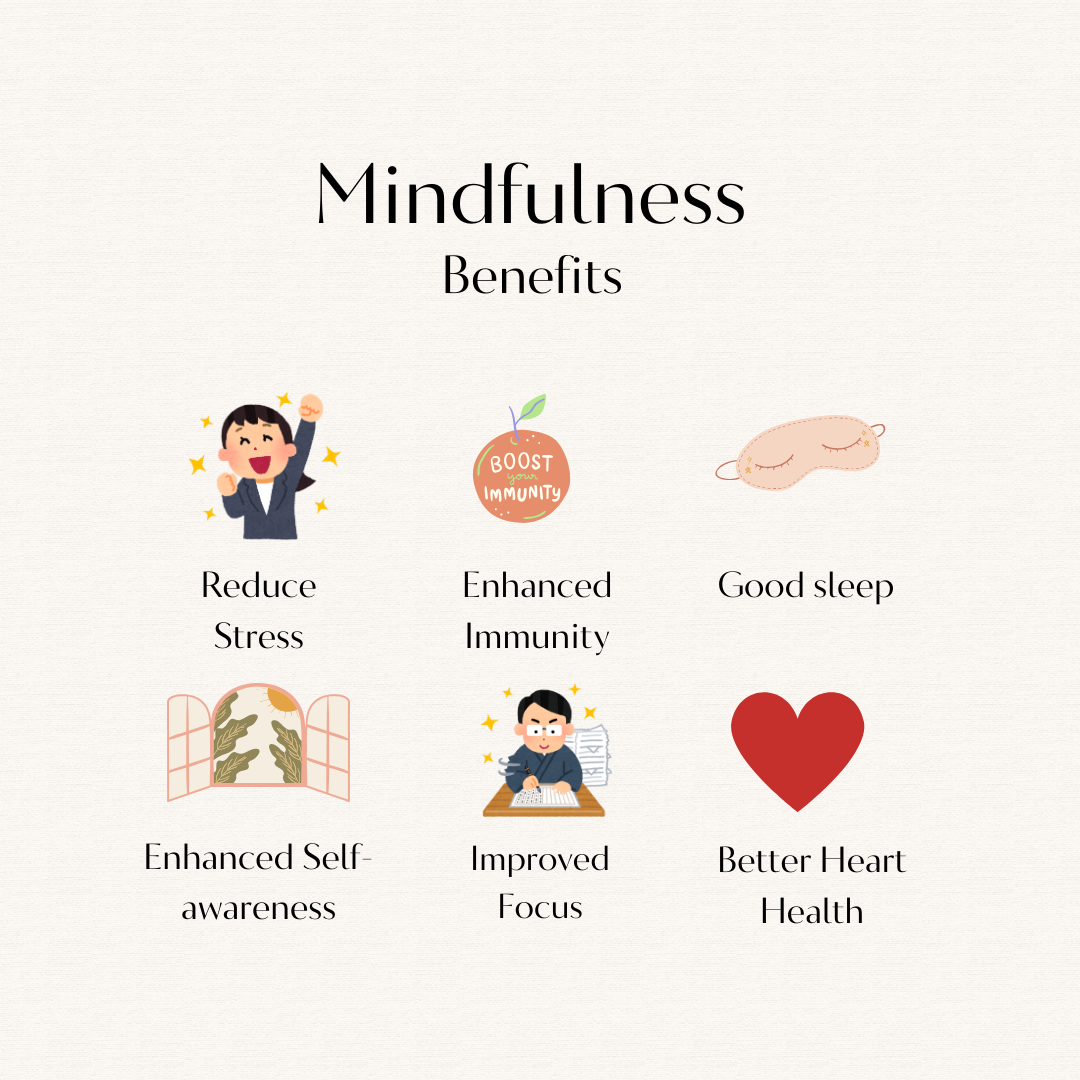The practice of mindfulness involves keeping your curiosity, acceptance, and open mind while concentrating your attention on the here and now. It entails observing your ideas, emotions, physical sensations, and the outside world objectively. The aim is to develop a sense of clarity and calmness as well as to become more conscious of your current experiences.
There are various ways to practice mindfulness, including:
- Meditation: Sitting quietly and focusing on your breath, bodily sensations, or a particular thought.
- Mindful Breathing: Paying attention to your breath as you inhale and exhale, often used as a grounding technique.
- Body Scan: Noticing and relaxing different parts of your body, starting from the toes and moving up to the head.
- Mindful Eating: Paying full attention to the taste, texture, and sensation of the food you’re eating.
According to research, engaging in mindfulness practices can have positive effects on stress levels, concentration, and emotional control. It is frequently employed as a therapeutic strategy in programs like mindfulness-based cognitive therapy (MBCT) and mindfulness-based stress reduction (MBSR).
Here’s a comprehensive look at how mindfulness can positively impact well-being:
Mental Health Benefits
- Reduces Stress: Being mindful can help cut down on cortisol, which in turn can cut down on stress in general. Deep breathing and meditation are two methods that encourage relaxation by triggering the parasympathetic nervous system.
- Enhances Emotional Regulation: By raising awareness of one’s emotional state and facilitating improved response control, mindfulness training can help with emotional regulation.
- Reduces Anxiety and despair: Research has demonstrated that mindfulness-based therapies can lessen the symptoms of anxiety and despair. Rumination can be stopped by practicing mindfulness, which encourages a non-judgmental awareness of thoughts and feelings.
- Enhances Focus and Concentration: Consistent mindfulness practice can improve cognitive function and attention span, which will make it easier to focus and remain in the moment.
- Increases Resilience: By supporting adaptive coping mechanisms and a balanced viewpoint, mindfulness can help people become more resilient.
Physical Health Benefits
- Reduces Chronic Pain: Mindfulness practices, particularly mindfulness-based stress reduction (MBSR), can help manage chronic pain by altering the perception of pain and reducing the emotional distress associated with it.
- Enhances Immune Function: Research suggests mindfulness can positively affect immune system function, potentially lowering illness risk. By reducing stress and inflammation, and enhancing immune responses, mindfulness helps maintain overall health. While promising, it should complement a balanced lifestyle that includes diet, exercise, sleep, and medical care for optimal well-being.
- Improves Sleep Quality: Mindfulness techniques can help with sleep disturbances by promoting relaxation and reducing the mental chatter that can interfere with falling asleep.
- Supports Cardiovascular Health: Mindfulness practices are linked to lower blood pressure and better heart health by reducing stress and promoting relaxation. By fostering a calm state of mind, mindfulness helps lower stress hormones like cortisol, which can improve cardiovascular function and reduce the risk of hypertension and heart disease. Regular mindfulness practice supports overall heart health through its stress-relieving and relaxation-enhancing effects.
- Aids in Weight Management: Mindful eating practices, which involve paying attention to the sensory experience of eating and recognizing hunger and fullness cues, can support healthier eating habits and weight management.
Cognitive Benefits
- Improved Focus: Mindfulness enhances attention and concentration by training the mind to stay on task and reduce distractions.
- Enhanced Memory: Regular mindfulness practice can improve working memory and cognitive flexibility, aiding in the ability to recall information and adapt to new situations.
- Better Decision-Making: By promoting clearer thinking and reducing impulsivity, mindfulness helps in making more thoughtful and deliberate decisions.
- Increased Emotional Regulation: Mindfulness fosters greater awareness of emotions, leading to improved emotional control and resilience in challenging situations.
- Reduced Cognitive Biases: It helps in recognizing and minimizing cognitive biases, such as negative thinking patterns, leading to more balanced and objective thinking.
Social and Behavioural Benefits
- Improved Relationships: Mindfulness enhances empathy and active listening, leading to more meaningful and compassionate interactions with others.
- Better Communication: By fostering awareness and reducing reactive behavior, mindfulness helps in expressing thoughts and feelings more clearly and effectively.
- Reduced Conflict: Mindfulness promotes emotional regulation, which can decrease the likelihood of conflicts and improve conflict resolution skills.
- Increased Patience: Practicing mindfulness helps in developing patience and tolerance, which can lead to more positive and considerate behavior.
- Enhanced Self-Awareness: Mindfulness increases self-awareness, helping individuals understand their behavior patterns and triggers, which supports personal growth and better social interactions.
- Greater Resilience: Mindfulness builds resilience to social stress and challenges, allowing individuals to handle social pressures and adversities more effectively.
Mindfulness offers many benefits for both your mind and body. It helps reduce stress and anxiety. By focusing on the present, you improve your concentration. Mindfulness can lead to better decision-making and stronger relationships. It promotes emotional balance and mental clarity. A few minutes each day can make a big difference. Simple practices, like deep breathing or meditation, can enhance your well-being. Incorporating mindfulness into your routine helps you stay calm and focused. Embrace this practice to lead a healthier, more balanced life. Start small and notice the positive changes it brings.


One thought on “The Power of Mindfulness: Proven Benefits for a Better Life”